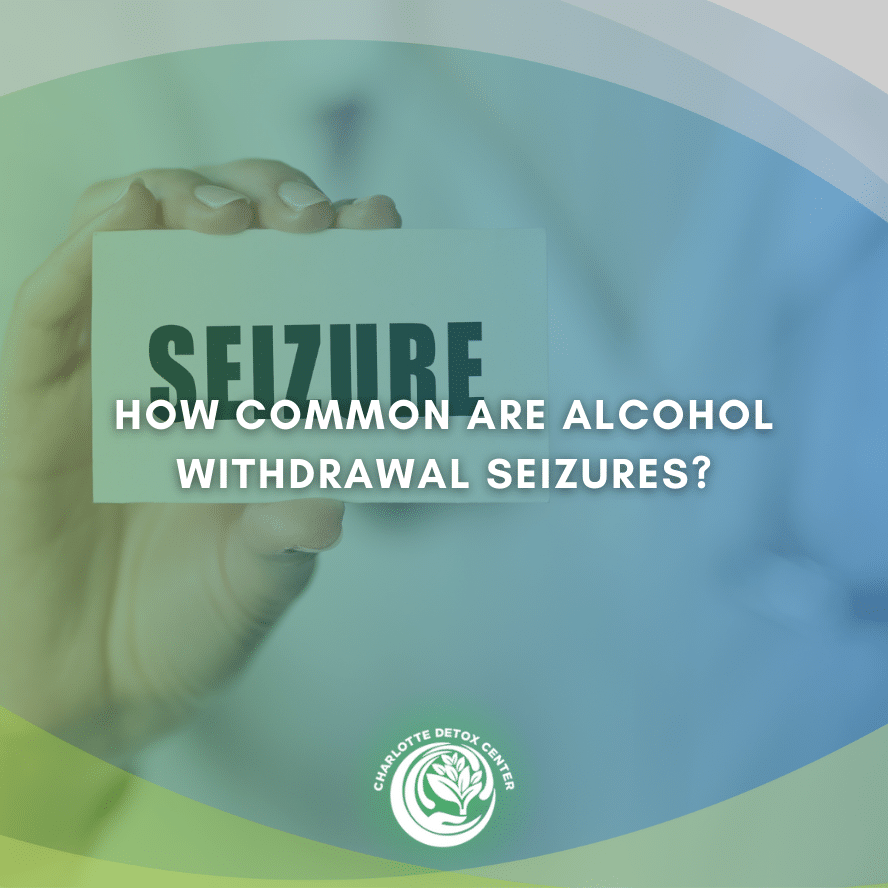How Common are Alcohol Withdrawal Seizures?

Medically Verified: 2/1/24
Medical Reviewer
Chief Editor

All of the information on this page has been reviewed and verified by a certified addiction professional.
According to the National Institute on Alcohol Abuse and Alcoholism (NIAAA), nearly 30 million people aged 12 or older struggled with alcoholism in 2021.[1]
If you or a loved one suffers from alcoholism, quitting alcohol cold turkey can be incredibly dangerous. One of the most worrisome symptoms of alcohol withdrawal is seizures. When you suddenly stop drinking alcohol without medical assistance, you could develop alcohol withdrawal seizures.
What are Alcohol Withdrawal Seizures?
Alcohol withdrawal seizures may occur when individuals with a severe alcohol use disorder stop drinking alcohol. The type of seizures these individuals may experience is known as “tonic-clonic” or “grand mal” seizures. The name “tonic-clonic” comes from the combination of tonic (stiffening) and clonic (jerking) symptoms.
People who develop alcohol withdrawal seizures usually experience them within 48 hours of their last drink. However, these seizures can happen at any time during the withdrawal process, making it vital that you receive medical assistance.
Seizures are characterized by:[2]
- Stiff muscles
- Loss of consciousness
- Making a crying or groaning noise
- Jerking of the arms and legs
- Loss of bladder or bowel control
- Limited or stopped breathing
- Blue lips
- Arched back
Tonic-clonic seizures can result in death if they are not treated by medical professionals. If you or a loved one begins to experience seizures during alcohol withdrawal, contact emergency medical services immediately.
Risk Factors for Alcohol Withdrawal Seizures
Alcohol withdrawal seizures are most common among individuals with severe alcohol use disorders, however, they can happen to anyone who is detoxing from alcohol. Up to one-third of patients with significant alcohol withdrawal may experience seizures.[3]
Some risk factors increase your chances of experiencing seizures during alcohol withdrawal, including:
Quitting Cold Turkey
If you have a severe alcohol use disorder, quitting cold turkey will increase your risk of experiencing a seizure. This is because the brain is adjusted to the presence of alcohol. When you suddenly remove the substance, your central nervous system kicks into overdrive, leading to dangerous symptoms like seizures.
The Kindling Effect
Another risk factor for alcohol withdrawal seizures is known as “the kindling effect”. The kindling effect is a phenomenon where the more you experience withdrawal from alcohol, the more likely you are to experience severe symptoms like seizures.
Delirium Tremens (DTs)
Lastly, if you develop delirium tremens (DTs), you are at a high risk of experiencing seizures. DTs are a condition that you can develop during severe alcohol withdrawal. While this condition can be avoided by receiving proper medical treatment, many people who attempt to detox at home develop delirium tremens.
The symptoms of delirium tremens include:[4]
- Agitation and irritability
- Aggressive behavior
- Confusion
- Trembling
- Excessive sweating
- Nausea and vomiting
- Tachycardia
- Impaired consciousness
- Visual, tactile, or auditory hallucinations
- Seizures
How to Prevent Alcohol Withdrawal Seizures
The only way to ensure that you do not experience seizures or other complications during alcohol withdrawal is to detox under medical supervision. During detox, you will be provided with 24/7 monitoring, IV fluids, and medications that lessen the symptoms of alcohol withdrawal.
The medications commonly used to control the severity of alcohol withdrawal symptoms include:[5]
- Benzodiazepines – the main medications used to taper individuals off of alcohol and prevent severe symptoms from arising.
- Beta Blockers – often used to help lessen the symptoms of alcohol withdrawal like anxiety or restlessness
- Clonidine – helpful in controlling pulse and blood pressure during alcohol withdrawal
- Haloperidol – might be provided in cases of delirium tremens when benzodiazepines are not working effectively
By attending an alcohol detox center, you can rest assured that you will receive the proper treatment necessary to detox safely and move on to the next stage of recovery.
Find Help for Alcohol Withdrawal
If you or a loved one suffers from alcohol use disorder, never attempt to detox at home. Doing so could result in dangerous and even life-threatening symptoms like seizures. Instead, seek help from an alcohol detox program that can provide you with the proper treatments, tools, and support necessary.
Our clinical team at Charlotte Detox Center is here to meet all of your detox needs. We offer individualized treatment plans and a small patient-to-staff ratio to ensure that each person in our care receives the best possible support. With teams made up of clinicians, doctors, counselors, and recovery coaches, we will be with you every step of the way – starting with alcohol detox.
To learn more about our North Carolina alcohol detox center or to get started with a confidential, risk-free assessment, please call now.
References:
- The National Institute of Alcohol Abuse and Alcoholism (NIAAA): Alcohol Use Disorder (AUD) in the United States: Age Groups and Demographic Characteristics, Retrieved September 2023 From https://www.niaaa.nih.gov/alcohols-effects-health/alcohol-topics/alcohol-facts-and-statistics/alcohol-use-disorder-aud-united-states-age-groups-and-demographic-characteristics
- The National Library of Medicine (NLM): Generalized Tonic-Clonic Seizure, Retrieved September 2023 From https://www.ncbi.nlm.nih.gov/books/NBK554496/
- The National Library of Medicine (NLM): Update on the Neurobiology of Alcohol Withdrawal Seizures, Retrieved September 2023 From https://www.ncbi.nlm.nih.gov/pmc/articles/PMC1312739/
- The National Library of Medicine (NLM): Delirium Tremens, Retrieved September 2023 From https://www.ncbi.nlm.nih.gov/books/NBK482134/
- The National Library of Medicine (NLM): Alcohol Withdrawal Syndrome: Benzodiazepines and Beyond, Retrieved September 2023 From https://www.ncbi.nlm.nih.gov/pmc/articles/PMC4606320/
